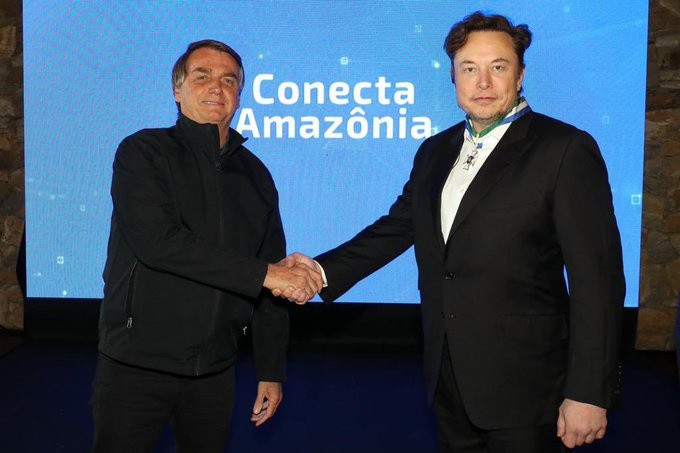
Following a gathering held on May 20th in São Paulo, which assembled Brazilian president Jair Bolsonaro, 10 businessmen, five ministers, and Starlink's Elon Musk, an agreement was made to leverage Starlink satellites for various purposes around the Amazonian rainforest. The newly-rendered Starlink coverage map will grow into Brazil over the next few months, aiding the country in such services as rainforest analysis, surveying for potential fires, which reached well over 1,000 last year alone, and supplying local schools with enhanced broadband services.
The agreement was announced via Brazil's Communications minister Fablo Faria alongside Bolsonaro following the meeting. Musk himself relayed the news on Twitter, highlighting the potential of utilizing the new Starlink internet capabilities in nearly 19,000 rural set schools. Although no official contracts have been signed on the proposed deal, Brazil did relay in a press release that all financial obligations, investment considerations, and technical concepts would be "discussed at a later date, with the public and private sector stakeholders involved."
Super excited to be in Brazil for launch of Starlink for 19,000 unconnected schools in rural areas & environmental monitoring of Amazon! 🇧🇷 🌳 🛰 ♥️
— Elon Musk (@elonmusk) May 20, 2022
Starlink, a subsidiary under SpaceX, has previously stated the potential output of up to 120 internet satellites on a per-month basis, with a slated number positioned at 4,408 upon the Anatel telecommunications agency agreement. Signed in late Jan, Anatel partnered with Starlink in operational rights over Brazil, which would allow the satellite internet firm full exploitation rights until 2027.
Related Article: Starlink Raises Prices: Elon Musk's Company Blames Inflation
On Musk's visit, president Bolsanaro considered it a "milestone" for Brazil, highlighting the necessary resources now capable of advancing the preservation of the Amazonian rainforest through technology. The Amazon has been hit hard over the last several years, most prominently via deforestation, which has in 2022 alone risen by 64% in its first quarter. Aided via Starlink, these environmental concerns can well be counteracted and amend certain constraints levied at Bolsonaro for his supposed ignorance of the ever-growing issues in Brazil's Amazon.
-Conversei há pouco com @elonmusk , que visita o Brasil a convite do Ministro @fabiofaria . Entre outros assuntos, tratamos de conectividade, investimentos, inovação e o uso da tecnologia como reforço na proteção de nossa Amazônia e na realização do potencial econômico do Brasil. pic.twitter.com/mijIdgvJS5
— Jair M. Bolsonaro (@jairbolsonaro) May 20, 2022
"Of course, there are niches for fires and irregular deforestation. But the arrival of satellites will help us preserve [the rainforest]. Now, we also need to develop the region, which is very rich in biodiversity and mineral wealth," Bolsonaro explained.
Apart from his so-called environmental ignorance, Bolsonaro has likewise been criticized for his approach to Russia and its invasion of Ukraine. The Brazilian head of state met with Russian President Vladimir Putin not mere days before initiating war with the neighboring country, which Bolsonaro has yet to officially and publicly denounce. The president was voted into office via leveraging social networks back in 2018 and has recently stated Musk's $44 billion Twitter deal as a "breath of hope" in April 2022.
While left unstated in any of the public announcements, Musk's true intentions may well lie in Brazil's rather large lithium mining production, which as of 2021 sits at around 1,500 metric tons, marking it as among the most prominent global producers of the mineral next to Chile, China, Australia, and Argentina. As of October last year, Tesla has switched to lion-ion-phosphate batteries, making Brazil an area of interest beyond its environmental concerns.
ⓒ 2026 TECHTIMES.com All rights reserved. Do not reproduce without permission.




